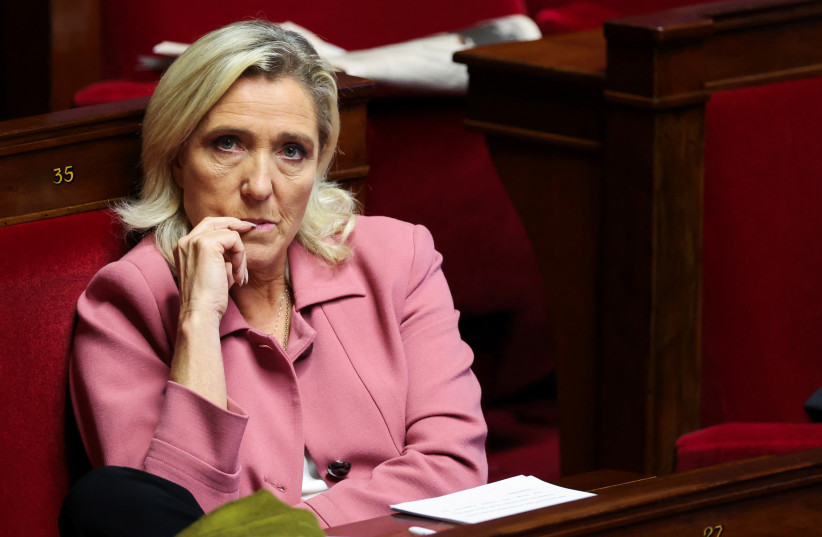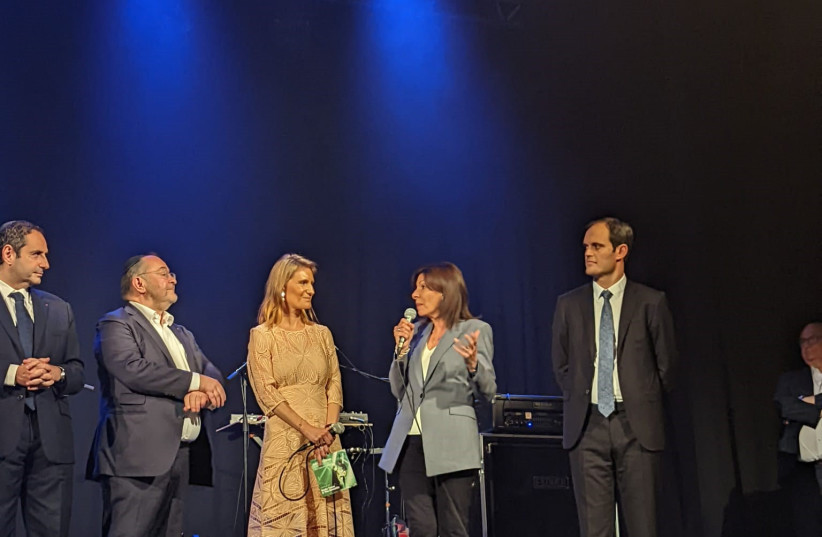There is an old Hassidic tale about a Jew who was forced by a powerful nobleman to eat pork.
Seeking advice, he went to his rabbi who, understanding the dire situation, said, “Eat the pork, but don’t let the grease drip down your beard.” In other words, if you have to eat the treif (non-kosher) food, so be it, but do not derive pleasure from it.
That story was recalled Monday by an astute observer of the French political scene when evaluating how Jerusalem should relate to Sunday’s first round of parliamentary elections. Marine Le Pen’s far-right National Rally Party won a whopping 33% of the vote, followed by the union of left-wing parties called the New Popular Front (28%) – that includes the anti-Israel France Unbowed – and the centrist Ensemble bloc of President Emmanuel Macron (21%).
Much can happen between now and Friday, the second round of elections, and it is by no means clear at this point exactly what kind of government will emerge. One possible scenario, but not the only one, is that Le Pen’s Party will manage to squeeze together some kind of coalition.

Le Pen’s party has for the French Jewish community and Israel long been viewed as treif, with its roots in the antisemitic, Holocaust-denying National Front of Le Pen’s father, Jean-Marie Le Pen. The younger Le Pen purged her father and other antisemites and Holocaust deniers from the party, and for years has been trying to distance the party from its less savory past and come into the good graces of the Jewish community and Israel, because that would give a party once believed to be beyond the pale, a degree of legitimacy.
If Le Pen’s party does manage to form a government, Israel will have no choice but to deal with it – but if historical precedent with other far-Right parties is any indication, it will not be the first to jump in line, but rather wait to see how other European states act.
Diaspora Affairs Minister Amichai Chikli, however, seems to come from another school of thought entirely. Asked in a KAN Reshet Bet interview if it would be good for Israel for Le Pen to be president, Chikli – jumping way ahead of himself because Macron still has three years to go in his term – replied: “It would be excellent for Marine Le Pen to be the president.”
Asked if she was preferable as president to Macron, Chikli started to say the Hebrew word for “certainly,” but then caught himself mid-word and instead contrasted what Jordan Bardella, Le Pen’s candidate for prime minister should the National Rally form the government, said about a Palestinian state, to what Macron has said.
“Bardella said a week ago that after October 7 to grant a state to the Palestinians would be folly and a prize for terrorism, while Macron says, ‘I support a Palestinian state, but have to consider the timing.’ These are dramatic differences.”
Asked again if he wants to see Le Pen as the president of France, Chikli replied: “If you ask if it is good for the state of Israel, in my eyes it is good for the state of Israel.”
Perhaps, however, Chikli should have been asked another question altogether: whether it is wise for an Israeli minister to weigh in so unequivocally in the internal politics of another country? Another question could be asked as well: is it good for an Israeli minister to take a position on the internal politics of another country that goes against the sentiment of that country’s organized Jewish community?
French Jews decry extremism
And such full-throated support for Le Pen and the National Rally Party is not at all where CRIF, the umbrella organization of French Jews, is on the issue.
Just days before the election, CRIF put out a communique quoting what its president Yonathan Arfi told Le Monde about the election, “No extreme Right, no extreme Left.”

In other words, a plague on the houses of the extreme-Right National Rally, and also on the New Popular Front, a union of left-wing parties formed to block Le Pen that includes the antisemitic France Unbowed. Arfi said in that interview that the New Popular Front is unworthy, as is the National Rally.
The CRIF, which has always opposed the National Rally, assures that it “will continue to do so,” saying, “It is an extremely dangerous party for French society, which has never been a bulwark against antisemitism. Anything that threatens the republican framework and universalism is fundamentally dangerous for Jews.”
And of the France Unbowed Party and the union of other left parties with it, Arfi tweeted this: “France Unbowed has made hatred of Jews its electoral business: allying with it means dealing with antisemitism.”
Ever since Jörg Haider’s Freedom Party became a member of Austria’s government in 2000, Israel has faced the dilemma of how to deal with far-Right European parties, the vast majority – with the glaring exception Geert Wilders’ Party for Freedom in the Netherlands – have historical roots in Nazism or fascism. The policy that developed is to defer on whether to engage with these parties to the local Jewish communities, who are better positioned to understand them.
As one former foreign ministry official put it, “The Jewish communities know better than we do who is antisemitic, they know the codes and can discern who is antisemitic in Vienna and Stockholm, Rome and Berlin.”
The crucial point, he stressed, was for there not to be daylight with the local Jewish community about embracing or giving legitimacy to a party on the extremes.
Chikli, apparently, is unaware of that policy, or doesn’t agree with it. “I am not competing with the Jewish community, and do not disregard the position of the Jewish community – it’s everyone’s right to think differently. I am looking at it first and foremost from the Israeli perspective.”
And in his mind, the far Right is good for Israel.
It is possible to simplify and boil down this way of thinking to the following over-generalized equation: if the far Left today is antisemitic and anti-Israel, and the far Right is antisemitic but pro-Israel, then Israel is better off with the latter. At least for the time being.
The question, however, is: How long the far Right’s pro-Israel position will remain, and when will its inherent antipathy to the stranger and the Other and turn on the Jews. Now it is focused on Muslim immigrants in Europe, but when will it focus on Jews who are the quintessential Other?
The future of France
The stunning defeat that Macron and his party sustained in the elections – and the high probability that the next prime minister will not be from his own party – renders him a lame-duck president for the next three years until his term expires.
And that political weakness will have geopolitical ramifications. France, up until now, has been the leading country in Europe – and the only country in the EU with a significant army – that has been forceful about the need to stop Russia in Ukraine. Le Pen and the National Rally, who even if they don’t form the government will have a great deal of power in the parliament, have taken a much softer line on Russian President Vladimir Putin.
Also in regard to Iran, France has often towed the toughest line toward the Iranians and their nuclear program, even more so than the US. A politically weakened France, however, might not be in a position to do so if and when nuclear negotiations with Iran ever do restart.
As far as the Mideast is concerned, though Bardella has spoken against a Palestinian state, and the National Rally took a strong line against Hamas – as opposed to the Unbowed France and its leader Jean-Luc Mélenchon who refused to call October 7 an “act of terrorism” – Le Pen has strong relations with Arab countries. It is difficult to imagine that a new government led by her party – even one strongly opposed to Muslim immigration – is going to turn its back on France’s considerable interests in the Arab world.
